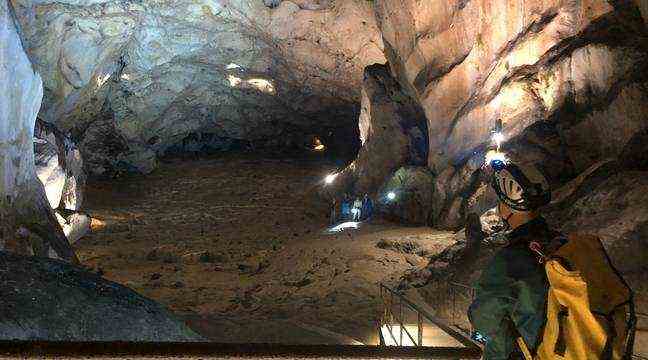The adventurers of “Deep Time” spent forty days in a cave. – Mélusine Mallender / Deep Time
- “Deep Time”, the experiment which consisted of locking up 15 volunteers in a cave for 40 days, ended on Thursday.
- As the volunteers leave the cave this Saturday, the experience could bring many discoveries.
- Fragility of time, behavior under confinement, behavioral studies … 20 minutes make the point.
How many times a day do you check the time? On screens, clocks, morning alarm clocks, panels or microwaves, the notion of time is omnipresent, so much so that it is rare in 2021 to spend more than three hours without knowing what time it is. . So imagine forty days. Forty days with no notion of time or space, not even the sun to know if it is day or night, a calendar to know the day. A total lack of notion of time in which 15 volunteers immersed themselves, literally at the end of the Lombrives cave, in Ariège, in a scientific experiment called Deep Time.
After forty days underground, the brave will rediscover the sun’s rays this Saturday. The experience is over since Thursday, but this day serves as a transition and a sort of temporal decompression airlock so that the recovery is not too brutal. So, 40 days without benchmarks, what is it?
Desynchronization from day one
Without a time frame, the individuals of experience reason in terms of a cycle, a cycle comprising a part of activity and a part of rest. Which equates us to a day of work followed by a night’s sleep. With us, on the surface and with all our time units, a cycle therefore corresponds to 24 hours.
But underground, it is impossible to know what time each cycle lasts. Did we sleep seven or twelve hours? Are we awake for 10 or 20 hours? On March 23, nine days after entering the cave, Christian Clot, head of the operation, was in his ninth cycle, while other Deep Timers were at 10 or 7. Mélusine Mallender, director in responsible for the project, announced during a round table at the Cité des Aventuriers: “From the first day, a person woke up at the end of everyone’s day. And gradually, everyone started to get out of sync ”. Mélusine Mallender participated briefly in the experiment, remaining only seven “cycles”. And coming out of the cave, she thought it was Monday morning, instead of Sunday night.
In Search of Lost Time
By day 12, the Deep Timers admitted to having totally lost track of time, having no idea what day it might be outside, let alone whether it was morning, afternoon or evening. This experience therefore shows how the notion of time is a fragile benchmark.
But that’s not the only lesson Deep Time should provide. When they leave on Saturday, the fifteen volunteers will be examined at length: weight, number of foods ingested during the stay, mood. Deep Time should make it possible to know how the body and the mind react when they are deprived of reference. Batteries of tests are also carried out every day on the volunteers in order to measure the evolution over time.
Expected returns
“It will be interesting to observe to what extent our behaviors are dependent on the information they receive”, explains Camille Avin, behavioral psychologist. “Do we really eat because we are hungry or because we know it’s time to eat?” », She takes as an example. All the volunteers attest to having lost weight, as indicated by the last podcast sent to the surface. The psychologist also recalls that many studies already show behaviors dependent on environmental situations and information. “To keep the example of food, we know that we will eat more if we are with other people than alone. Because we will be afraid of missing. “
However, the notion of time is all the more interesting here because of the health crisis. According to a mental health survey of 10,000 people in 2020, 40% of participants lost track of the time between different restrictive measures and boredom. “We still do not know a lot about the mental impact of confinements, curfews and the current situation”, pleads Camille Avin. “Such a scientific experiment, if it is of course more extreme than confinements, makes it possible to study these still little-known phenomena”. But also to study the development of sight, the inner ear, sociability in a hostile environment (the cave is at 12 degrees, in the dark, before 100% humidity).
And the studies will not stop there, since the Deep Timers will still be analyzed after their release to see the impact of the return to normal life on them. Tests that could even last several months. Again, a matter of time.

